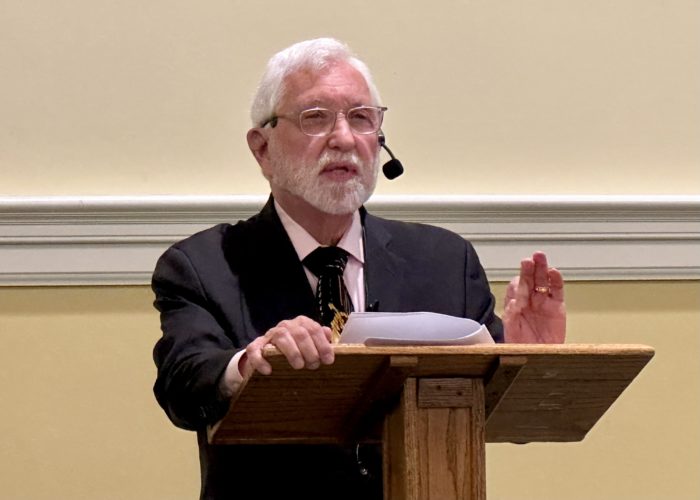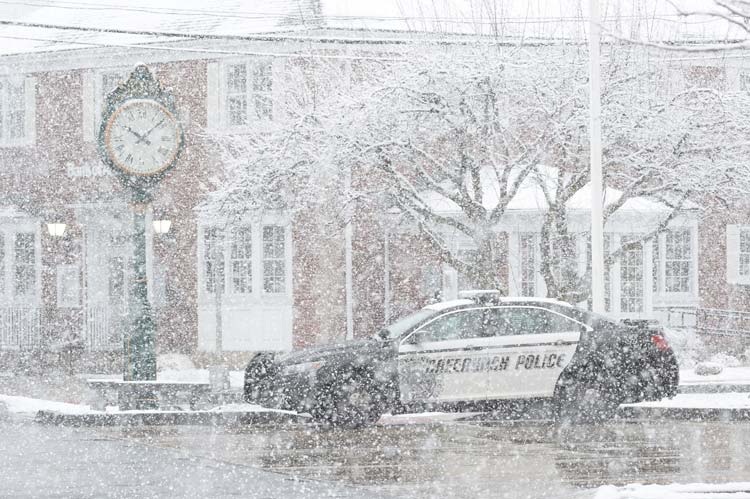
By Frank Scarpa
The Retired Men’s Association speaker on December 18, introduced by Spike Lipschutz, was the Honorable Jed S. Rakoff. Judge Rakoff has served as a U.S. District Judge for the Southern District of New York since 1996. He has published over 200 articles and has co-authored five books. He presented his own point of view on the history of the Supreme Court’s interventions, in a talk entitled “Why the Supreme Court is the Most Conservative Branch of the U.S. Government.”
In his lecture, Judge Rakoff focused on the Supreme Court’s approach to constitutional interpretation throughout history. He began by stating his own philosophy, citing Benjamin Cardozo’s view that a constitution should state principles for an expanding future, not just rules for the present. However, Judge Rakoff argued that this approach has not been the dominant one for the Supreme Court throughout most of its history. He posited that the Supreme Court has typically looked backward, using the Constitution as a tool to override progressive legislation and deny protection to minorities and unpopular individuals. He acknowledged that this conclusion might seem surprising, given that the Warren Court, which inspired him to become a lawyer, took a more progressive approach. However, he suggested that the Warren Court was an exception in the Court’s history.
To support his argument, Judge Rakoff delved into the early history of the Court. He noted that in its first decades, under Chief Justice John Marshall, the Court focused on establishing a broad construction of the powers of the new government and judiciary. However, he pointed out that during this period, the justices were unanimous in denying rights to African Americans and Native Americans, interpreting the Constitution as implicitly considering these groups “inferior.” (Even the Declaration of Independence refers to Native Americans as “merciless Indian savages.”) Judge Rakoff illustrated this point with the 1831 case of Cherokee Nation v. State of Georgia. Despite the Cherokee Nation’s having signed treaties with the U.S. government, Chief Justice Marshall ruled that Native Americans were not a foreign nation in the sense meant by the Constitution, but rather “wards of the President.” This decision effectively denied the Cherokee Nation the right to sue in federal court and led to their forced removal along the Trail of Tears.
The lecture then moved to focusing on the infamous 1857 Dred Scott case. Judge Rakoff explained the background of Dred Scott, a slave who had lived in free territories and sued for his freedom. The Supreme Court, in a 7-2 decision, ruled against Scott, effectively denying rights to all African Americans, whether free or enslaved. This approach to “originalism” led directly to the Civil War.
Judge Rakoff’s presentation provided a critical perspective on the Supreme Court’s historical role in interpreting the Constitution. By examining key cases and decisions, he challenged the notion of the Court as a consistently progressive institution, instead portraying it as an often-conservative force. Throughout his lecture, Judge Rakoff emphasized the importance of understanding this historical context when considering the current Supreme Court’s approach to constitutional interpretation. He suggested that the Court’s tendency to look backward and use the Constitution to uphold conservative viewpoints has been a recurring theme throughout its history, with few exceptions like the Warren Court.
The judge’s analysis invited the audience to reconsider their understanding of the Supreme Court’s function and impact throughout U.S. history. By highlighting the Court’s historical treatment of Native Americans and African Americans, he demonstrated how the institution has often failed to protect the rights of marginalized groups, despite its theoretical role as a guardian of constitutional rights.
The lecture also touched on the economic biases present in the early years of the Supreme Court, noting the influence of political affiliations on judicial decisions. Judge Rakoff explained how the Court’s composition shifted over time as different political parties gained power, but argued that these changes did little to alter the Court’s overall conservative approach to constitutional interpretation.
In conclusion, Judge Rakoff’s presentation offered a compelling argument for viewing the Supreme Court as historically conservative in its approach to constitutional interpretation. By tracing this trend from the Court’s earliest days through landmark cases, he provided a nuanced understanding of the institution’s role in shaping American law and society. This historical position is crucial for understanding the current Supreme Court’s decisions and its potential impact on future generations.
As an explanation for the Court’s decision-making, the Judge posited:
–The “political” nature of the justices’ selection process.
–Conservatives, “inherently suspicious of reform,” have placed more effort into influencing the judiciary.
–Emphasis on precedent is inherent in English law, and this influence was felt early on.
A brief Q and A period touched on such topics as term limits and the presidential immunity decision.
The talk can be viewed by going to the RMA website at https://greenwichrma.org, and clicking on “Speakers.”
The RMA’s upcoming presentation, “From Intuition to Insight: A Journey in Street Photography” by Jean-Marc Bara, is scheduled for 11 AM on Wednesday, January 8, 2025. Please note that this and all future RMA presentations will be held at Christ Church Greenwich, 254 E. Putnam Avenue, Greenwich, CT 06830, in Parish Hall.
This presentation will feature a curated selection of Jean-Marc Bara’s street photography, exploring the question, “Why do I like this photo?” Through this lens, he will discuss the relationship between a photographer’s personality and visual style, the ways our brains interpret images, and practical tips for those curious about trying this rewarding hobby. Designed to engage both the eyes and the mind, the 40-minute talk will be followed by a 20-minute Q&A session.
Jean-Marc Bara is an accomplished street photographer with a passion for capturing candid moments that reveal the unexpected order, beauty, ambiguity, wonder, or humor of urban life and everyday scenes. After retiring, he rediscovered his love for photography and has exhibited his work locally, nationally, and internationally. His accolades include being a 2023 Category Grand Winner and earning two 2022 Category Silver Medals at the Paris International Street Photography Awards (PISPA). He is also a Category Silver Winner at the 2023 International Photography Awards (IPA) and the 2023 Tokyo International Foto Awards (TIFA). Additionally, Jean-Marc was a finalist at the 2023 Pisa International Street Photography Festival (PSPI) and the 2022 Miami Street Photography Festival (MSPF). Jean-Marc, his wife Marianne, and their son Patrick have lived in Greenwich since 1997.
Note: The views expressed in these presentations are those of the speakers. They are not intended to represent the views of the RMA or its members.
RMA speaker presentations are presented as a community service at no cost to in-person or Zoom attendees, regardless of gender. Any member of the public who would like to receive a weekly email announcement of future speakers should send a request to members@greenwichrma.org. The RMA urges all eligible individuals to consider becoming a member of our great organization, and thereby enjoy all the available fellowship, volunteer, and community service opportunities which the RMA offers to its members. For further information, go to https://greenwichrma.org/, or contact info@greenwichrma.org.




